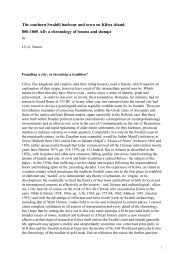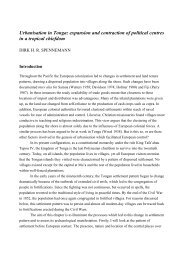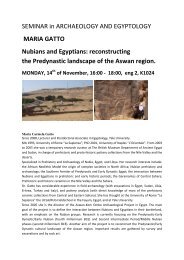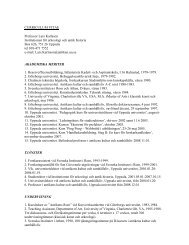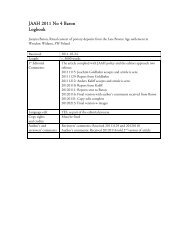Beowulf - Institutionen för arkeologi och antik historia
Beowulf - Institutionen för arkeologi och antik historia
Beowulf - Institutionen för arkeologi och antik historia
You also want an ePaper? Increase the reach of your titles
YUMPU automatically turns print PDFs into web optimized ePapers that Google loves.
The point of the law is to link a rule to the stratification of society and to tell us that the<br />
serf, although a man, is not a human being, but more like a soul-less animal or a<br />
thing.The divide between thane and serf, þegn and þrel, is in other words that between<br />
the socially accepted and the socially unacceptable man.<br />
Gräslund has, in a recent article (1995), discussed the meaning of good on runestones,<br />
from a gender perspective, pointing out that if good means ‘generally speaking<br />
good’, as Herschend proposed (1994b, pp. 187 ff.), it is strange that so very few<br />
women are described as good. In agreement with Strid, Gräslund rejects Moltke’s<br />
views (Moltke 1985, pp. 288 f.) and explains the lack of epithets expressing quality,<br />
as well as of descriptions of women’s achievements and women’s ways of dying, as<br />
a result of the narrow world—the farms and the local community (cf. Holtsmark<br />
1964, col. 565 ff.)—of the rune-stone woman. Women, at least in the Mälar Valley,<br />
were privately, but not publicly good.<br />
So, in relation to Moltke’s view upon the word also Gräslund favours a general<br />
meaning. Good does mean generally speaking good, but rune-stone texts are not<br />
designed to give a fair picture of the usage. This gender bias is odd, but perhaps<br />
significant for the Late Iron Age, since there are other words, which are in our opinion<br />
rather neutral, such as the Anglo-Saxon (wel)-þungen, i.e., accomplished or<br />
excellent, a word used about women only. We can, however, be sure that several<br />
men considered themselves accomplished or excellent.<br />
Hovstad (1958) discusses the connection between good and drengr and he gives<br />
several examples from The Sagas of the Icelanders showing that good is a reinforcing<br />
of the word drengr parallel to constructions such as drenglikr and dreng-skapr.<br />
Good drengr thus means a good man, trustworthy and helpful of the weak. His<br />
examples suffice to show how (Christian) ethics influenced the meaning of good, and<br />
Hovstad dates this influence to the end of the Viking Age.<br />
In his discussion of the personal qualities of the Icelandic goði, Sigurðsson (1993,<br />
pp. 94 ff. and p. 95 note 5) points to two examples of the expression góðr drengr<br />
signifying two of the peaceful, nice and good-natured representatives of that group<br />
of men. Hovstad, Meulengracht Sørensen and Sigurðsson demonstrate the Christian<br />
and Pagan links necessary to understand the Christian and, moreover, Icelandic usage<br />
of drengr as a disposition, an internal quality, and thus also the stock expression<br />
drengr góðr. Their analyses supply us with a hint as to the general development of<br />
the usage, not least for the interpretation of the rune-stones.<br />
Even in the rune-stone material there are texts strongly pointing to a Christian<br />
meaning of good:<br />
Assurr gærði kumbl þessi æftiR Öind, faður sinn. Hann vaR manna mæstr oniðingR,<br />
vaR yndr mataR ok omunr hatrs. Goðr þegn Guðs tro goða hafði (SM 37).<br />
Assurr made this memorial after his father Öind. He was the most honest man, was<br />
generous with food and unwilling to revenge. A good þegn; he had God’s good<br />
faith.<br />
59



